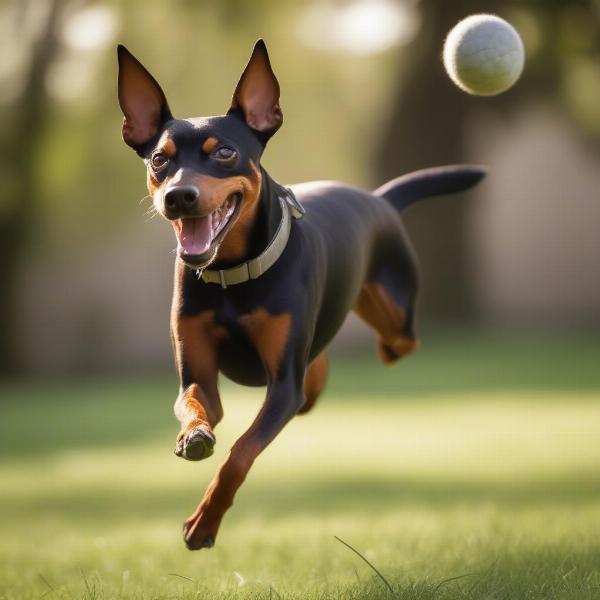German Pinschers are energetic, intelligent, and loyal dogs, making them wonderful companions. However, like any breed, they sometimes find themselves in need of a new home. This comprehensive guide will explore everything you need to know about German Pinscher dog rescue, from finding a reputable organization to preparing your home for your new furry friend.
Understanding the German Pinscher Temperament
Before diving into the specifics of rescue, it’s crucial to understand the German Pinscher temperament. These dogs are known for their high energy levels and intelligence. They thrive on activity and require consistent training and socialization. While affectionate with their families, they can be wary of strangers and may exhibit protective instincts. Understanding these traits will help you determine if a German Pinscher is the right fit for your lifestyle and prepare you for the unique challenges and rewards of rescuing one.
 German Pinscher playing fetch
German Pinscher playing fetch
Finding a Reputable German Pinscher Rescue Organization
Locating a reputable rescue organization is the first step in your German Pinscher rescue journey. A good rescue will prioritize the well-being of their dogs. They will thoroughly screen potential adopters, ensure the dogs receive necessary veterinary care, and provide accurate information about each dog’s history and temperament. Look for organizations that:
- Conduct home checks
- Require adoption applications and interviews
- Provide detailed information about each dog’s medical history and behavioral traits
- Are transparent about their adoption fees and policies
Preparing Your Home for a Rescued German Pinscher
Bringing a rescued German Pinscher home requires preparation. These dogs are active and need a secure environment. Ensure your yard is fenced, remove any potential hazards, and stock up on essential supplies like food, bowls, a leash, collar, and toys. Creating a safe and comfortable space will help your new companion adjust to their surroundings.
The Adoption Process: What to Expect
The adoption process varies between organizations but typically involves an application, interview, and home check. Be prepared to answer questions about your lifestyle, experience with dogs, and why you’re interested in adopting a German Pinscher. Honesty is key throughout this process, ensuring the best match for both you and the dog.
Settling Your German Pinscher Into Their New Life
Patience is vital when introducing a rescued German Pinscher to their new home. They may be anxious or unsure at first. Provide a quiet, safe space where they can retreat and decompress. Establish a consistent routine for feeding, exercise, and potty breaks. Positive reinforcement training methods will build trust and strengthen your bond.
Common Challenges and Solutions with Rescued German Pinschers
Rescued German Pinschers can sometimes come with behavioral challenges stemming from past experiences. These might include separation anxiety, fear of strangers, or food guarding. Working with a certified dog trainer can help address these issues effectively.
Conclusion
Rescuing a German Pinscher can be a deeply rewarding experience. By understanding their breed-specific needs and being prepared for the adoption process, you can provide a loving and supportive home for a deserving dog. Remember, patience, consistency, and positive reinforcement are key to building a strong bond with your new companion. Finding a reputable [german pinscher dog rescue] organization is the first step to providing a loving forever home for these intelligent and energetic dogs.
FAQ
- How much exercise does a German Pinscher need? German Pinschers are energetic and require a significant amount of daily exercise, including walks, runs, and playtime.
- Are German Pinschers good with children? With proper socialization, German Pinschers can be good with children, but supervision is always recommended.
- What is the average lifespan of a German Pinscher? German Pinschers typically live between 12 and 15 years.
- Are German Pinschers prone to any health problems? Like all breeds, German Pinschers can be prone to certain health issues, such as hip dysplasia and eye problems.
- Do German Pinschers bark a lot? German Pinschers can be vocal and prone to barking, especially if not properly trained.
- Are German Pinschers easy to train? German Pinschers are intelligent and eager to please, making them relatively easy to train with consistent positive reinforcement.
- What kind of grooming do German Pinschers need? German Pinschers have a short, smooth coat that requires minimal grooming.
Related Articles
ILM Dog is a leading international website dedicated to providing expert advice and resources on dog care and breeding. We offer comprehensive guides on various breeds, including their selection, health, training, nutrition, grooming, and more. With a focus on providing practical tips and insights, ILM Dog is your trusted source for all things canine. For expert advice tailored to your specific needs, contact us at [email protected] or call +44 20-3965-8624. Learn more and explore our vast library of resources at ILM Dog.